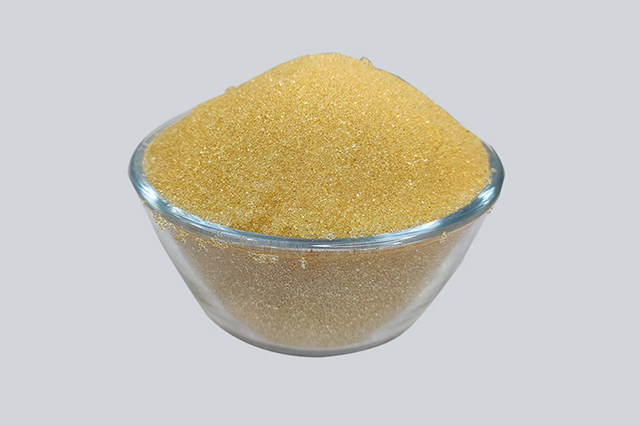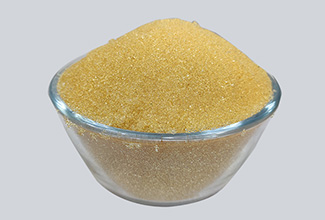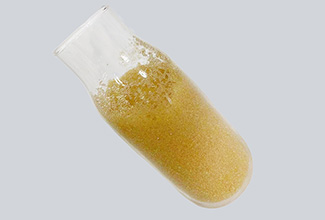Why Do You Need Water Softener Resin?
Water is essential to daily life, but did you know that hard water can cause a lot of issues in your home or business? From limescale buildup in appliances to clogged pipes, hard water can make life a little more difficult. That's where water softener resin comes in. But what exactly is it, and how does it work? Let's break it down!

What is Water Softener Resin?
Water softener resin is a key component of a water softening system. It's a type of synthetic material, usually made of small beads, that removes minerals like calcium and magnesium from the water. These minerals are what make water "hard," and they can cause a range of problems if left untreated.
The resin beads are charged with sodium ions. When hard water passes through the resin, the beads attract and hold onto the calcium and magnesium ions, exchanging them for sodium ions. This process is known as ion exchange, and it's how water softeners turn hard water into soft water.

Why Do You Need Water Softener Resin?
Hard water can cause a lot of headaches for homeowners and businesses alike. Some of the common issues caused by hard water include:
Limescale buildup: Over time, hard water can leave mineral deposits on your pipes, appliances, and faucets, leading to costly repairs and replacements.
Inefficient soap use: Hard water makes soap less effective, meaning you may need to use more soap or detergent to get the same results.
Clogged pipes: Minerals from hard water can build up inside pipes, leading to blockages and reduced water flow.
Skin and hair problems: Hard water can leave your skin feeling dry and your hair feeling brittle.
By using water softener resin, you can avoid these issues, improve the efficiency of your appliances, and enjoy cleaner, softer water.
How Does Water Softener Resin Work?
When you install a water softener, the water flows through a tank filled with resin beads. As the water moves through, the resin beads remove the calcium and magnesium, replacing them with sodium. This process is called ion exchange, and it happens over and over as the water continues to flow through the resin.
Eventually, the resin beads become saturated with calcium and magnesium, so they need to be "recharged." This is done using a salt solution (typically sodium chloride), which flushes the minerals out and replaces them with fresh sodium ions. This process is known as regeneration, and it ensures that your water softener continues to work efficiently.
The Benefits of Using Water Softener Resin
Protect your appliances: Water softener resin helps prevent limescale buildup in dishwashers, washing machines, and water heaters, extending their lifespan and keeping them running smoothly.
Improve water quality: Soft water can help you get better results from soaps, shampoos, and detergents, so you can save money and reduce chemical usage.
Prevent plumbing issues: Soft water reduces the risk of mineral buildup in pipes, helping to avoid clogs and improve water flow.
Gentler on skin and hair: Soft water can leave your skin feeling softer and your hair looking shinier by eliminating the harsh minerals found in hard water.
Choosing the Right Water Softener Resin
When selecting water softener resin, there are a few factors to consider:
Capacity: The amount of resin you need will depend on the size of your water softener system and the level of hardness in your water. A professional can help you determine the right amount.
Quality: Not all resins are created equal. Look for high-quality, durable resins that offer long-lasting performance.
Regeneration: Choose a system that’s easy to regenerate, ensuring that your resin continues to work effectively over time.

What is Water Softener Resin?
Water softener resin is a key component of a water softening system. It's a type of synthetic material, usually made of small beads, that removes minerals like calcium and magnesium from the water. These minerals are what make water "hard," and they can cause a range of problems if left untreated.
The resin beads are charged with sodium ions. When hard water passes through the resin, the beads attract and hold onto the calcium and magnesium ions, exchanging them for sodium ions. This process is known as ion exchange, and it's how water softeners turn hard water into soft water.

Why Do You Need Water Softener Resin?
Hard water can cause a lot of headaches for homeowners and businesses alike. Some of the common issues caused by hard water include:
Limescale buildup: Over time, hard water can leave mineral deposits on your pipes, appliances, and faucets, leading to costly repairs and replacements.
Inefficient soap use: Hard water makes soap less effective, meaning you may need to use more soap or detergent to get the same results.
Clogged pipes: Minerals from hard water can build up inside pipes, leading to blockages and reduced water flow.
Skin and hair problems: Hard water can leave your skin feeling dry and your hair feeling brittle.
By using water softener resin, you can avoid these issues, improve the efficiency of your appliances, and enjoy cleaner, softer water.
How Does Water Softener Resin Work?
When you install a water softener, the water flows through a tank filled with resin beads. As the water moves through, the resin beads remove the calcium and magnesium, replacing them with sodium. This process is called ion exchange, and it happens over and over as the water continues to flow through the resin.
Eventually, the resin beads become saturated with calcium and magnesium, so they need to be "recharged." This is done using a salt solution (typically sodium chloride), which flushes the minerals out and replaces them with fresh sodium ions. This process is known as regeneration, and it ensures that your water softener continues to work efficiently.
The Benefits of Using Water Softener Resin
Protect your appliances: Water softener resin helps prevent limescale buildup in dishwashers, washing machines, and water heaters, extending their lifespan and keeping them running smoothly.
Improve water quality: Soft water can help you get better results from soaps, shampoos, and detergents, so you can save money and reduce chemical usage.
Prevent plumbing issues: Soft water reduces the risk of mineral buildup in pipes, helping to avoid clogs and improve water flow.
Gentler on skin and hair: Soft water can leave your skin feeling softer and your hair looking shinier by eliminating the harsh minerals found in hard water.
Choosing the Right Water Softener Resin
When selecting water softener resin, there are a few factors to consider:
Capacity: The amount of resin you need will depend on the size of your water softener system and the level of hardness in your water. A professional can help you determine the right amount.
Quality: Not all resins are created equal. Look for high-quality, durable resins that offer long-lasting performance.
Regeneration: Choose a system that’s easy to regenerate, ensuring that your resin continues to work effectively over time.
Last One :
Next Article :
Related Products
-
 001X7 Cation Exchange ResinIonic form:Na+Appearance: Claybank to tan transparent spherical particle.The degree of crosslinking : 7%.
001X7 Cation Exchange ResinIonic form:Na+Appearance: Claybank to tan transparent spherical particle.The degree of crosslinking : 7%. -
 001X8 water softener ion exchange ResinIonic form:Na+Appearance: Claybank to tan transparent spherical particle.The degree of crosslinking : 8%.
001X8 water softener ion exchange ResinIonic form:Na+Appearance: Claybank to tan transparent spherical particle.The degree of crosslinking : 8%. -
 Strong Acid Cation Exchange Resin for water treatmentAppearance: Claybank to tan transparent spherical particle.The degree of crosslinking : 10%.Ionic form:Na+
Strong Acid Cation Exchange Resin for water treatmentAppearance: Claybank to tan transparent spherical particle.The degree of crosslinking : 10%.Ionic form:Na+
Message

